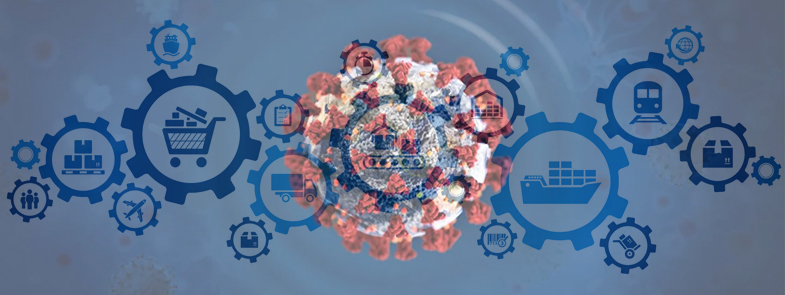With supply chain uncertainty, it makes sense to not delay your 2020 purchase of POWER9 and storage.
The new COVID-19 virus is making its way around the globe. In response, governments are issuing travel embargoes, companies are ordering staff to work from home if possible, and people are stocking up on groceries, fuel, and water.
IBM has recently requested its workers in China, Japan, South Korea, and Italy work from home and has designed contingency plans for employees elsewhere (the details of those plans were unavailable at the time of writing this article). Participation at conferences, meetings, and trade shows will be evaluated on an individual basis. Company travel is restricted to some locations, and just recently IBM cancelled its in-person participation at the RSA cyber security conference in San Francisco from February 24–28, along with other tech giants like AT&T and Verizon. There are no stated plans for IBM to scale down participation for other conferences. My guess is they’re in a wait-and-see mode like most companies: reduce risk as events unfold.
The supply chain is another matter entirely. China effectively shut down a large portion of its manufacturing sector in January with a stated reopening of February 9. That date came and went with little change. The overall manufacturing output from China has dropped significantly and is anticipated to stay that way for the next couple of months. As previously Chinese-manufactured parts inventories are drying up around the globe, the potential for disrupting manufacturing facilities of IBM Power Systems and storage increases.
Take a step back to the 2002–2003 SARS epidemic. SARS started in China’s Guangdong province in 2002 and led to 8,000 cases worldwide in 2003. It barely registered on the financial markets. Back then, China represented 4.3 percent of the world GDP. In the last 20 years, global supply chains have become leaner and more streamlined, with a focus on offshoring and outsourcing. If a disruption occurs in the supply chain, the ripple effect downstream can wreak havoc on manufacturing resulting in parts shortages. Today, China represents 16 percent of the world’s GDP. In the last week, the U.S. markets plunged the most since the financial crisis of 2008 amid COVID-19 effects. China has converted itself as the factory source for the world in the last 20 years. Apparel, technology, automotive, packaged goods...China is a major source.
Proximity to the source matters too. Given that other companies closer to the outbreak source have shut down manufacturing plants due to not being able to get parts from China, you have to assume they have much shorter lead times than North American manufacturers, and that plays a role. With that assumption, you can probably forecast some manufacturers in North America may be in for a reduction in production or outright shutdowns due to parts shortages. Apple and Microsoft announced to investors in February that they would miss sales targets due to supply chain forecasts but didn’t attach any real numbers to those estimates.
Personally, I ordered a laptop battery back in December. I paid for 5‒7 day delivery; it took over 30 days. IBM Power Systems and storage systems are produced in Guadalajara, Mexico. You have to wonder what their parts lead time is and how much inventory they have in the can to produce new systems.
What does that mean for you, IBM i customer?
Well, for starters, since 2019 IBM has announced end-of-service for many POWER5, POWER6, POWER7, and POWER7+ systems. The POWER7+ E4D machines are good until 2020. I’ve spoken to all sorts of customers looking to move to POWER9...and they run the gamut from POWER5 to POWER7+. There’s still a lot of stragglers out there. You have to sell the value proposition of the POWER9. The E4D customers are usually much larger, and I think they’re thinking it’ll be financially painful to remain on that architecture after December 31, 2020.
Either way, we have four generations of IBM systems all going end-of-service in the span of two years. Many of those customers are upgrading to POWER9. Many are taking that opportunity to refresh their storage as well, especially on the E4D side of the coin.
If I were the plant manager of Guadalajara, I’d probably be preparing for this by ensuring I had additional inventory on hand for likely manufacturing increases in 2019 and 2020. It’s just math. Take old systems out of support and likely you’ll see people want to ensure they have a supported path forward. That means IBM would have to manufacture those new systems to facilitate the path.
Maintenance renewal dates play a role, too. If you have your E4D up for renewal in July of this year, then you should be buying the machine now and thinking about the migration rather than having to do a limited maintenance renewal on the old machine in July to remain supported until you’re migrated. We just don’t know how COVID-19 supply chain issues will affect ordering machines in October. I have some customers whose maintenance won’t run out on their E4D until November. I’m pushing them to go to POWER9 early just in case supply chain issues are elongated or compounded. They can then get a credit on their old maintenance contracts. It’s better to be safe than sorry, especially with those E4D machines going end-of-service in December. Imagine having to pay for extended maintenance because their new machine hasn’t been built and delivered yet.
I ordered a new POWER9 for a customer in Georgia on February 4. It arrived February 13. That was pretty swift. How long will that type of speed last?
Truth be told, I have no idea what the inventories in Guadalajara look like. They could be set up for six months or six days for all I know. With this uncertainty, if I were looking to upgrade to a POWER9 or get a new V5030E, I would not wait until June to make a decision. Your migration could very well be many months away.






















 More than ever, there is a demand for IT to deliver innovation. Your IBM i has been an essential part of your business operations for years. However, your organization may struggle to maintain the current system and implement new projects. The thousands of customers we've worked with and surveyed state that expectations regarding the digital footprint and vision of the company are not aligned with the current IT environment.
More than ever, there is a demand for IT to deliver innovation. Your IBM i has been an essential part of your business operations for years. However, your organization may struggle to maintain the current system and implement new projects. The thousands of customers we've worked with and surveyed state that expectations regarding the digital footprint and vision of the company are not aligned with the current IT environment. TRY the one package that solves all your document design and printing challenges on all your platforms. Produce bar code labels, electronic forms, ad hoc reports, and RFID tags – without programming! MarkMagic is the only document design and print solution that combines report writing, WYSIWYG label and forms design, and conditional printing in one integrated product. Make sure your data survives when catastrophe hits. Request your trial now! Request Now.
TRY the one package that solves all your document design and printing challenges on all your platforms. Produce bar code labels, electronic forms, ad hoc reports, and RFID tags – without programming! MarkMagic is the only document design and print solution that combines report writing, WYSIWYG label and forms design, and conditional printing in one integrated product. Make sure your data survives when catastrophe hits. Request your trial now! Request Now. Forms of ransomware has been around for over 30 years, and with more and more organizations suffering attacks each year, it continues to endure. What has made ransomware such a durable threat and what is the best way to combat it? In order to prevent ransomware, organizations must first understand how it works.
Forms of ransomware has been around for over 30 years, and with more and more organizations suffering attacks each year, it continues to endure. What has made ransomware such a durable threat and what is the best way to combat it? In order to prevent ransomware, organizations must first understand how it works. Disaster protection is vital to every business. Yet, it often consists of patched together procedures that are prone to error. From automatic backups to data encryption to media management, Robot automates the routine (yet often complex) tasks of iSeries backup and recovery, saving you time and money and making the process safer and more reliable. Automate your backups with the Robot Backup and Recovery Solution. Key features include:
Disaster protection is vital to every business. Yet, it often consists of patched together procedures that are prone to error. From automatic backups to data encryption to media management, Robot automates the routine (yet often complex) tasks of iSeries backup and recovery, saving you time and money and making the process safer and more reliable. Automate your backups with the Robot Backup and Recovery Solution. Key features include: Business users want new applications now. Market and regulatory pressures require faster application updates and delivery into production. Your IBM i developers may be approaching retirement, and you see no sure way to fill their positions with experienced developers. In addition, you may be caught between maintaining your existing applications and the uncertainty of moving to something new.
Business users want new applications now. Market and regulatory pressures require faster application updates and delivery into production. Your IBM i developers may be approaching retirement, and you see no sure way to fill their positions with experienced developers. In addition, you may be caught between maintaining your existing applications and the uncertainty of moving to something new. IT managers hoping to find new IBM i talent are discovering that the pool of experienced RPG programmers and operators or administrators with intimate knowledge of the operating system and the applications that run on it is small. This begs the question: How will you manage the platform that supports such a big part of your business? This guide offers strategies and software suggestions to help you plan IT staffing and resources and smooth the transition after your AS/400 talent retires. Read on to learn:
IT managers hoping to find new IBM i talent are discovering that the pool of experienced RPG programmers and operators or administrators with intimate knowledge of the operating system and the applications that run on it is small. This begs the question: How will you manage the platform that supports such a big part of your business? This guide offers strategies and software suggestions to help you plan IT staffing and resources and smooth the transition after your AS/400 talent retires. Read on to learn:
LATEST COMMENTS
MC Press Online